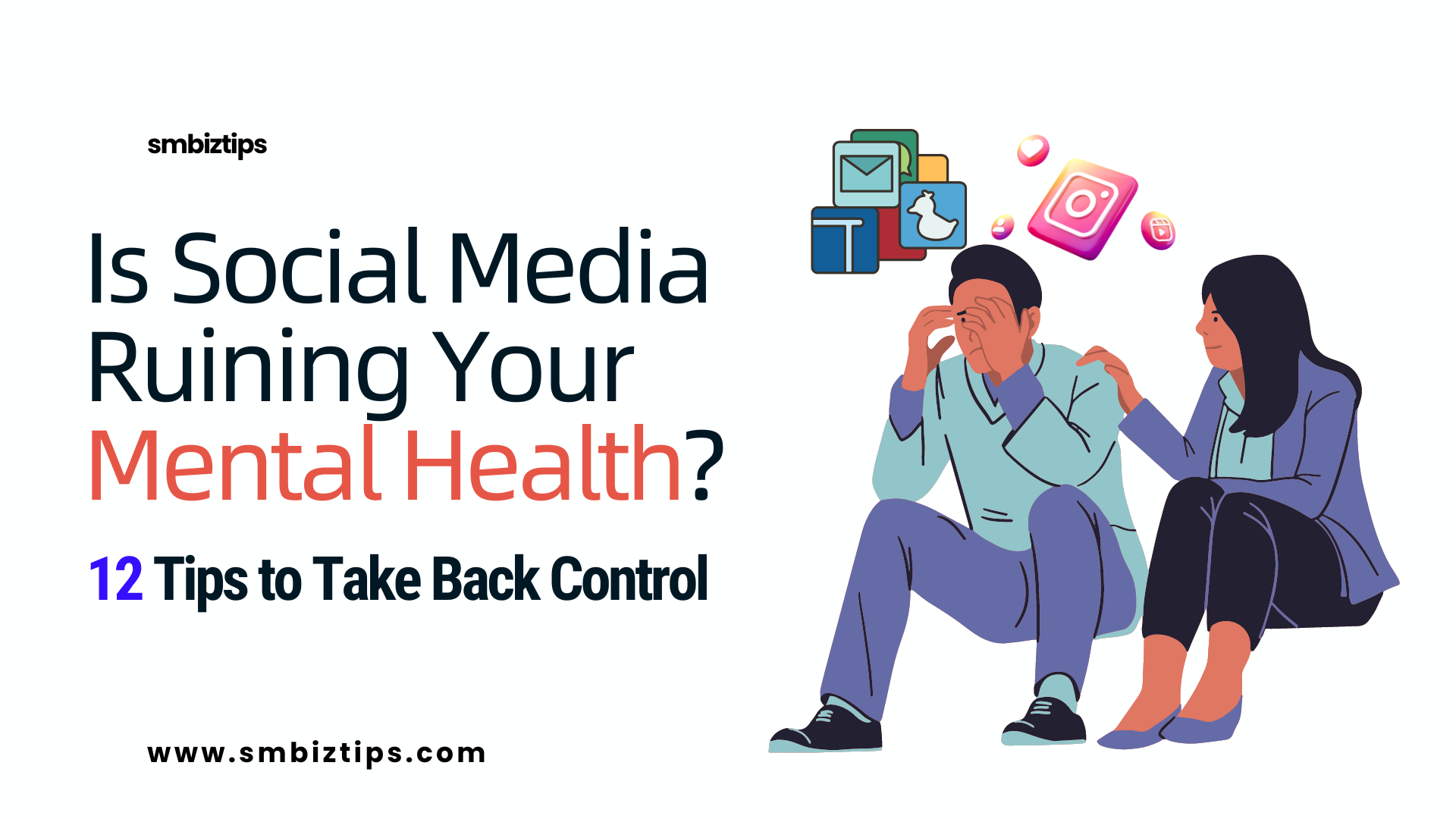Let’s face it, social media is everywhere. From the moment we wake up to the last scroll before bed, these platforms flood our lives with a constant stream of information, connection, and, well, sometimes negativity, too.
Look, social media can be amazing. It connects us with friends and family across the globe, allows us to share experiences, and opens doors to new communities. But there’s another side to the coin. Studies by the American Psychological Association suggest that excessive social media use can contribute to feelings of anxiety, depression, and even loneliness.
So, what’s the solution? Do we ditch our phones and retreat to a social media-free cave? Not necessarily. The key is finding a healthy balance, and that’s exactly what this guide will help you achieve.
Here, we’ll explore 10 practical tips to navigate the social media landscape while safeguarding your mental well-being. Buckle up and get ready to control your online experience!
Tip #1: Be wary of the highlight reel.
Social media is a curated reality. People tend to share the best moments of their lives—the vacations, the achievements, the perfectly staged photos. It’s simple to fall into the trap of comparing your everyday life to this highlight reel, leading to feelings of inadequacy.
Remember: Everyone experiences challenges, but they don’t appear on social media. Social media is not a true reflection of someone’s life.
Action Step: Practice gratitude for the positive things in your own life, big or small.
Tip #2: Set boundaries and time limits.
The endless scroll is real. Without realising it, we can lose ourselves in a social media vortex for hours. This constant online presence can disrupt sleep patterns, reduce productivity, and contribute to feelings of anxiety.
Data Point: A 2021 study by the Pew Research Centre found that teenagers who spend more than three hours a day on social media are more likely to report negative mental health effects.
Action Step: Establish realistic time limits for social media use. Utilise built-in app timers or download apps that can block social media during specific times.
Tip #3: Unfollow Negativity
Social media feeds are like gardens; you need to weed them out regularly. Follow accounts that inspire you, motivate you, and make you feel good. Unfollow or mute negativity, whether it’s drama-filled accounts or those that constantly bombard you with unrealistic beauty standards.
Action Step: Do a social media cleanse. Unfollow accounts that no longer spark joy, and actively seek out positive and uplifting content creators.
Tip #4: Curate Your Feed for Positivity
Following inspirational figures, amusing animal videos, or accounts dedicated to hobbies you enjoy can significantly shift your social media experience. There’s a whole world of uplifting content out there—find what makes you smile!
Action Step: Explore hashtags related to your interests or search for accounts that promote positivity and mental well-being.
Tip #5: Engage, not just consume.
Social media thrives on interaction. Liking and commenting are great, but consider taking it a step further. Join online communities related to your passions, strike up conversations, and build genuine connections. Human interaction, even online, can be incredibly rewarding.
Action Step: Participate in discussions, answer questions on topics you’re knowledgeable about, and use social media as a tool to connect with like-minded people.
Tip #6: Focus on real-life connections
While social media can connect us, it can’t replace face-to-face interaction. Make time for activities with friends and family, go for walks, or participate in group hobbies.
Data Point: A 2022 Harvard University study suggests that strong social connections can significantly improve mental and physical health.
Action Step: Schedule regular in-person catch-ups with loved ones, join a local club, or volunteer in your community.
Tip #7: Be mindful of your news consumption.
Social media can be a breeding ground for negativity, especially regarding news. Constant exposure to alarming headlines can elevate stress and anxiety.
Action Step: Choose reliable news sources and limit your social media news consumption. Seek out factual information directly from trustworthy websites.
Tip #8: Don’t believe everything you see.
Misinformation and negativity spread like wildfire online. Be critical of what you see. Fact-check information before sharing, and beware of sensationalized content.
Action Step: Use fact-checking websites to verify information before sharing it. If an item appears excessively favorable or unfavorable, it is likely not genuine.
Tip #9: Embrace the Power of “Off”
Sometimes, the best way to manage social media’s impact is to simply step away. Schedule social media breaks throughout the day—maybe during meals, before bed, or even for dedicated “digital detox” days.
Action Step: Turn off notifications, silence your phone, or put it away in another room to create screen-free zones. Rediscover the joy of being present in the moment.
Tip #10: Seek Help When Needed
Social media can exacerbate existing mental health struggles. If you’re feeling overwhelmed, anxious, or depressed due to social media use, it’s okay to seek help.
Action Step: Talk to a therapist or counsellor who specialises in technology and mental health. There are also online resources and helplines available to support you.
Remember, you can use social media for good or bad, just like any other tool. By following these tips and prioritising your mental well-being, you can harness the positive aspects of social media while minimising the negative. Take control of your online experience and create a social media space that empowers and uplifts you!
Tip #11: Be Aware of Confirmation Bias
Social media algorithms aim to maintain your engagement, potentially resulting in confirmation bias. This means you’re more likely to see content that reinforces your existing beliefs, creating echo chambers that can fuel negativity or limit your perspective.
Fact: A 2019 University of Chicago study found that exposure to echo chambers on social media can increase polarisation and decrease empathy towards opposing viewpoints.
Action Step: Diversify your feed! Follow accounts with different viewpoints and perspectives. Actively seek out news sources that challenge your existing beliefs.
Tip #12: Promote body positivity and set realistic goals.
Unrealistic beauty standards and portrayals of “perfect” lives flood social media. This constant bombardment can have a negative impact on self-esteem and body image, especially for teens and young adults.
Fact: The National Eating Disorders Association (NEDA) reports that comparing oneself to others on social media is a significant risk factor for developing eating disorders.
Action Step: Promote body positivity by following accounts that celebrate diversity in all shapes and sizes. Set realistic goals for yourself, focusing on health and well-being rather than aesthetics.
By incorporating these additional tips, you’ve created a well-rounded guide that empowers users to navigate the social media landscape with confidence. Remember, mental health is a journey, not a destination. So be patient with yourself, prioritise self-care, and don’t hesitate to seek help if you need it. With these tools and a mindful approach, you can harness the power of social media for good!
Conclusion: Social Media: A Tool, Not a Trap
Social media isn’t inherently bad. It’s a powerful tool for connection, creativity, and information sharing. However, you must use it responsibly, just like any other tool. By following the tips in this guide, you can transform your social media experience from a potential pitfall to a source of inspiration and positivity.
Remember:
- Be mindful of your consumption. Set boundaries and prioritise real-life interactions.
- Curate your feed. Surround yourself with uplifting content and positive influences.
- Engage and connect: Build genuine connections and participate in meaningful online communities.
- Be critical and sceptical. Don’t believe everything you see, and prioritise factual information.
- Embrace breaks and “off” times. Disconnect regularly to maintain a healthy balance.
- Seek help if needed. Mental health is a priority. Don’t hesitate to talk to a professional if you’re struggling.
By controlling your online experience, you can create a social media space that supports your mental well-being and empowers you to thrive. So go forth, explore, connect, and make social media a force for positive change in your life!
The Darker Side of Scrolling: Potential Mental Health Impacts
Research suggests that excessive social media use could be the new “sitting disease” for our mental well-being, similar to the numerous health problems associated with sitting. While scrolling through feeds might feel like a harmless way to fill spare moments, it appears to have some significant downsides.
The American Academy of Paediatrics has raised concerns about the negative impact of social media on young people, including cyberbullying and a phenomenon known as “Facebook depression.” However, these risks seem to extend to adults across generations. Here’s a look at some studies that highlight the potential harm that excessive social media use can have on our mental health:
- Social Media Addiction: Fact or Fiction?
While the concept of internet addiction remains debated, emerging evidence suggests social media addiction might be a real phenomenon. A Nottingham Trent University review analysed past research on psychological traits, personality, and social media use. The authors concluded that “Facebook Addiction Disorder” might be a valid concept, as some users exhibit classic addiction behaviours like neglecting real-life responsibilities, experiencing mental preoccupation, using it for escapism, and concealing the ehavior. Additionally, the study found that motivations for excessive social media use differ based on personality traits. Introverts and extroverts use it for different reasons, as do people with narcissistic tendencies.
- Are withdrawal symptoms more than just feeling anxious?
Studies are confirming that people who excessively use social media might experience withdrawal symptoms when they stop. A Swansea University study found that participants reported psychological withdrawal symptoms when they stopped using the internet (including social media). Their follow-up study revealed small but measurable physiological effects during withdrawal. While the research hasn’t definitively linked these effects to social media alone, anecdotal evidence suggests a potential connection.

